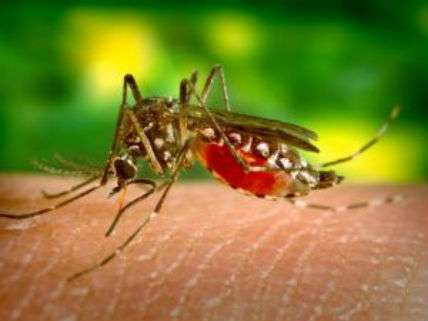Zika Coming to America: Use GMO Mosquitoes to Fight It!
Blame any zika-caused microencephaly on Friends of the Earth, the Center for Food Safety, Food & Water Watch, and GMO Free USA

Zika virus is most likely coming to the U.S. this summer. Researchers are more certain than ever that the virus is responsible for infants with microencephaly born from mothers infected with it and also cases of the paralyzing Guillain-Barré syndrome in some infected adults. The disease is spread by moquitoes, especially by the non-native Aedes aegypti mosquito that also carries yellow fever, West Nile, dengue, and chikungunya viruses. According the the Centers for Disease Control, Aedes aegypti is especially prevalent in the southern United States. Although infections acquired from mosquitoes on the mainland of the U.S. have not yet been confirmed so far, 82 cases of zika virus have been reported in southern Florida as of this week.
There is not yet a vaccine against the virus, but we are not totally defenseless. The first line of defense will be normal efforts at mosquito control including the elmination of breeding sites and spraying pesticides to kill off the bloodsuckers. But an even more elegant and efficient technique is waiting in the wings, if only the objections of anti-biotech activists can be overcome - mosquitoes genetically modified with a gene lethal to their larva. The GMO mosquito has been created by the biotech company Oxitec (now a subsidiary of Intrexon) and has already been successfully used to drastically reduce the populations of mosquitoes at test sites in Brazil, the Cayman Islands, and Panama.
A terrific op-ed in the New York Times by molecular biologist Nina Federof and former Secretary of Agriculture John Block asks, "Why aren't we quickly gearing up production and beginning large-scale programs to release these mosquitoes?" Their sad answer:
It's because the Oxitec mosquitoes are genetically modified organisms and subject to different regulatory oversight in different countries. In Brazil, for example, release of Oxitec mosquitoes has been approved by one government agency but awaits approval from another agency.
Despite its substantial expertise in insect control, the Department of Agriculture has regrettably not taken a role in helping navigate the regulatory complexities for this mosquito. So these insects are being regulated as a "new animal drug" by the F.D.A. The agency is now accepting public comments on Oxitec's plan and will then evaluate each one before deciding whether to approve the Florida trial.
You get the picture. None of this happens fast.
Then there's public opinion. More than 160,000 people signed a petition opposing Oxitec's trial in the Florida Keys, but most signed before the Zika crisis. In a recent Purdue University survey, 78 percent of respondents supported the use of genetically engineered mosquitoes to control the spread of the Zika virus.
The released male mosquitoes have no effect on people because males don't bite. While we might wait years for a Zika vaccine, the genetically modified mosquito is tested, scalable and ready to go.
Zika looks more devastating with every new study. Are the stakes finally high enough to expedite an effective, hemisphere-wide mosquito eradication program that makes use of modern genetic modification techniques?
Excellent question. Think how much further along we might have been in preventing the spread of this disease had Oxitec been permitted in 2012 to conduct its trial in the Florida Keys.
In March, the FDA actually ruled preliminarily that trials using the GMO mosquitoes are safe and could proceed. However, the agency yesterday bowed to pressure from the Friends of the Earth, the Center for Food Safety, Food & Water Watch, and GMO Free USA and delayed approval while extending the public comment period on the possible release of the mosquitoes to May 13.
My hope is that the public will reject scaremongering anti-biotech activism - one particularly kooky group actually suggested that the GMO mosquitoes in Brazil were responsible for microencephaly - and demand that FDA give its approval to use modern technology to combat this disease. After all, for how many babies born with microencephaly do FDA bureaucrats really want to be responsible?


Show Comments (37)